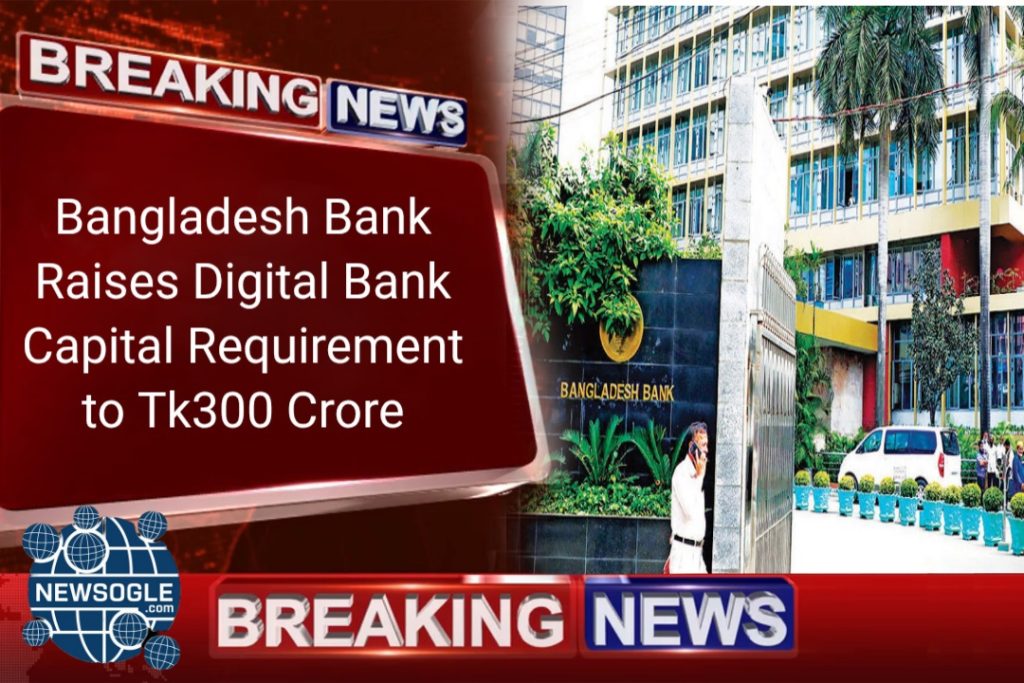
On August 26, 2025, Bangladesh Bank announced a significant regulatory revision affecting the country’s burgeoning digital banking sector—it raised the minimum capital requirement for digital banks from Tk 100 crore to Tk 300 crore. This landmark decision aims to strengthen the financial health and operational resilience of digital banks, enhance consumer confidence, and ensure sustainable growth in the evolving digital finance ecosystem. The move has generated widespread attention across the banking industry, fintech stakeholders, regulators, and the broader economic community.
This detailed news article explores the rationale behind the capital increase, analyzes its potential impacts on the digital banking landscape in Bangladesh, examines challenges and opportunities for existing and prospective players, and situates the development within the global digital banking trend. This comprehensive insight also provides SEO-optimized content designed to reach policymakers, financial analysts, industry peers, and engaged readers interested in Bangladesh’s financial sector innovations.
Background: Bangladesh’s Push for Digital Banking
Digital banking in Bangladesh has emerged as a promising frontier for financial inclusion, technological innovation, and financial sector expansion. Over the last five years, Bangladesh Bank introduced guidelines to license digital or mobile-only banks, requiring them initially to maintain a paid-up capital of Tk 100 crore (~$12 million). The goals included promoting a cashless economy, bridging the banking gap in underserved demographics, and providing convenient, scalable banking services digitally.
Several digital banks entered the market with robust investor backing, innovative consumer offerings, and rapid customer acquisition driven by mobile penetration and e-commerce growth. The sector’s dynamism attracted domestic and foreign investors and reshaped banking competition.
However, the capital adequacy requirement of Tk 100 crore, perceived as moderate compared to international benchmarks and emerging operational demands, led regulators to revisit the criteria. Risks related to cybersecurity, liquidity, customer protection, and compliance prompted Bangladesh Bank to strengthen prudential safeguards.
Details of the New Capital Requirement
The new regulation, announced by Bangladesh Bank’s Governor, stipulates that all digital banks must now hold a minimum paid-up capital of Tk 300 crore (approximately $35 million). This is three times the previous threshold, representing a significant increase designed to:
- Enhance capital buffers against operational losses and financial shocks.
- Support investments in technology infrastructure, cyber risk management, and regulatory compliance.
- Facilitate scaling to serve expanding customer bases and transaction volumes safely.
- Strengthen credibility and trust among customers, partners, and international financial institutions.
- Align Bangladesh’s digital banking regulatory framework with global best practices.
The regulation applies to both new entrants seeking licenses and existing digital banks operating under the prior framework. The central bank has provided a transitional period of 12 months for current licensees to meet the new capital requirements, encouraging capital raising, strategic partnerships, or mergers and acquisitions.
Industry Response and Potential Market Impacts
Existing Digital Banks
For existing digital banks, the new Tk 300 crore capital requirement presents challenges and opportunities. Some well-capitalized startups and subsidiaries of established banks welcomed the policy as a positive step that can weed out weaker operators, reduce risks, and foster market stability.
However, smaller or early-stage digital banks face pressure to secure additional funding on short notice. Options include:
- Raising new equity through institutional investors.
- Pursuing strategic alliances or mergers.
- Seeking capital support from existing parent companies.
- Exploring hybrid financing instruments or convertible bonds.
Failure to meet the deadline could lead to license cancellations or prohibitions on expanding operations, quickly reshaping the competitive landscape.
New Entrants and Fintech Startups
The higher capital bar raises the entry stakes for new digital bank applicants. While this may cool down speculative entries and reinforce seriousness, it could also reduce the pace of new startups entering the ecosystem, particularly smaller fintech innovators lacking deep-pocketed backers.
New firms and fintech entrepreneurs will have to:
- Demonstrate robust business models with significant capital backing.
- Form partnerships with established financial or strategic investors.
- Consider non-banking digital financial services as an alternative growth strategy.
Impact on Consumers and Financial Inclusion
In the medium to long term, the capital increase is expected to lead to enhanced consumer confidence in digital banks, improved service reliability, and better protection against financial irregularities.
However, some observers warn of the risk that increased capital requirements could reduce competition, leading to fewer options and slower innovation if smaller players are pushed out. Policy dialogue continues on balancing financial stability with financial inclusion goals.
Regulatory Objectives: Ensuring Stability and Innovation
Bangladesh Bank’s move aligns with its dual mandate:
- Financial Stability: Ensuring digital banks maintain adequate capital, liquidity, and risk management to absorb shocks and protect the financial system.
- Innovation Enablement: Facilitating a vibrant, technology-driven banking sector that supports digitization, improves customer convenience, and broadens financial access.
The capital increase responds to emerging global regulatory trends driven by lessons learned from digital bank failures in other countries and the realization that digital platforms need robust capitalization to withstand cybersecurity threats, regulatory costs, and operational volatility.
Global Context: Capital Requirements for Digital Banks Worldwide
Banking regulators globally have grappled with defining appropriate capital standards for digital-only banks. Examples include:
- The UK’s Prudential Regulation Authority mandates digital banking firms to maintain capital reflecting risks inherent in their business models, typically several tens of millions of pounds for start-ups.
- Singapore and Hong Kong require new digital banks to meet minimum capital ranging from SGD 100 million (~Tk 7,000 crore) and HKD 300 million (~Tk 3,000 crore), respectively.
- The European Central Bank imposes strict capital and governance requirements on digital banks to ensure resilience against cyber incidents and market shocks.
Compared to these, Bangladesh’s new Tk 300 crore capital minimum is a balanced and progressive step, tailored to local market scale, economic conditions, and technology maturation.
Future Outlook: Trends and Challenges
Capital Raising and Investment Flows
Meeting the new capital requirement will drive an influx of institutional investment into Bangladesh’s digital bank sector. Venture capital, private equity, foreign direct investment, and strategic corporate partnerships are expected to accelerate.
Improved capital bases will promote product innovation, infrastructure enhancement, and wider market penetration, contributing positively to the financial ecosystem.
Strategic Consolidations and Market Restructuring
The new rules may accelerate industry consolidations as smaller players merge or get acquired by larger entities to pool resources. This could lead to a more concentrated market but potentially more sustainable and competitive firms.
Regulatory Evolution
Bangladesh Bank may continue evolving its digital banking framework with standards on cybersecurity, anti-money laundering, customer data privacy, and competition policy to match the sector’s rapid growth and technological shifts.
Consumer Impact
Consumers stand to benefit from more reliable, secure, and diverse digital banking services over time, supported by stronger institutions. However, regulators must ensure policies preserve financial inclusiveness, especially for underbanked groups.
Conclusion
Bangladesh Bank’s decision to raise the digital banking capital requirement to Tk 300 crore represents a milestone in the country’s financial modernization journey. It reflects a prudent, forward-looking regulatory approach designed to foster a resilient, innovative, and trustworthy digital banking sector.
While posing funding and operational challenges for startups and evolving players, it offers long-term benefits by improving institutional strength, consumer trust, and market stability. As Bangladesh positions itself in the global digital finance revolution, this policy shift fortifies the foundation upon which the future economy will build.
Keywords for SEO Optimization
Bangladesh Bank digital banking policy, Tk 300 crore capital requirement, Bangladesh fintech regulation 2025, digital bank licensing Bangladesh, financial inclusion Bangladesh, digital banking sector reforms, Bangladesh Bank capital rules, digital banking investment Bangladesh, fintech ecosystem Bangladesh, Southeast Asia digital finance growth
This detailed report offers a comprehensive view of a pivotal regulatory development catalyzing the next phase of digital banking in Bangladesh. It is crafted for readers, investors, policymakers, and professionals seeking in-depth understanding of the evolving financial landscape.






